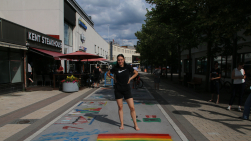The city aims for equality and equality in a planned way
Clear improvements are now coming to Imatra's equality plan.
- For example, we have agreed on the city's ethical principles in 2019. In them, the city commits to act transparently, to respect everyone equally and to see diversity as wealth, says the employment and development coordinator Circus Sarlomo from the city of Imatra.
Equality between the sexes has been on display a lot in recent years thanks to the metoo movement that has spread around the world. Racism and the status of sexual minorities have also gained a lot of space in the public debate. This has also had an impact on the progress of Imatra's equality measures.
However, according to Sarlomo, the city's equality plan consists of very everyday actions.
- Practices that increase equality include, for example, digital guidance for the elderly, alternative ways of doing business for electronic services, or the fact that participants in the Virta school and sports groups are taken in order of registration.
In order for the equality plan to be realized in practice, the city consults councils for the elderly and the disabled and cooperates, among other things, with the local Roma association Kipinä Ry, which promotes the integration of immigrants, and other organizations, and collects feedback from residents on the smoothness of services. Communication is targeted at different target groups and the accessibility of communication is constantly improved.
State of health, age and gender as reasons for discrimination
To support the preparation of the equality and equality plan, the city conducted a resident survey in the summer of 2021, asking if the city's residents have felt that they have been discriminated against or treated inappropriately when dealing with the city of Imatra.
A little over 50 responses were received to the survey. About half of the respondents had experienced discrimination or improper treatment by the city of Imatra.
- The answers show that there is still work to be done in equality and equality work, even if the sample selected based on the respondents' own interests does not correspond to the experience of all city residents, Sarlomo thinks.
The respondents felt that they received the most discrimination and improper treatment in health services. According to them, the most common reason for discrimination was health, followed by age and gender.
In the development proposals of those who responded to the survey, they hoped for better access to basic services and an improvement in the quality of services.
Feedback is valuable
Sirkku Sarlomo emphasizes that people have the right to receive equal services.
- As authorities, we have to work for that. Sometimes you succeed well and somewhere worse, and there are feedback channels to verify that. Based on the feedback, corrective measures can be taken. We don't have a magic lens, the information must come from the residents. Residents' feedback is needed so that the city can correct its operations.

The previous update of the equality and equality plan of the city of Imatra is from 2017. The plan is to be renewed by the end of 2021. The draft of the plan will be available for comment by the people of Imatra at the end of the current year. Follow the matter at imatra.fi/yhdenvertaisuus.
Equality and equality measures implemented in the city of Imatra in recent years
- Anticipatory impact assessment in preparing matters for decision-making in 2017
- Ethical principles in 2019
- The Romani working group was established in 2019
- The city withdrew the pride flag for the first time in the summer of 2021
